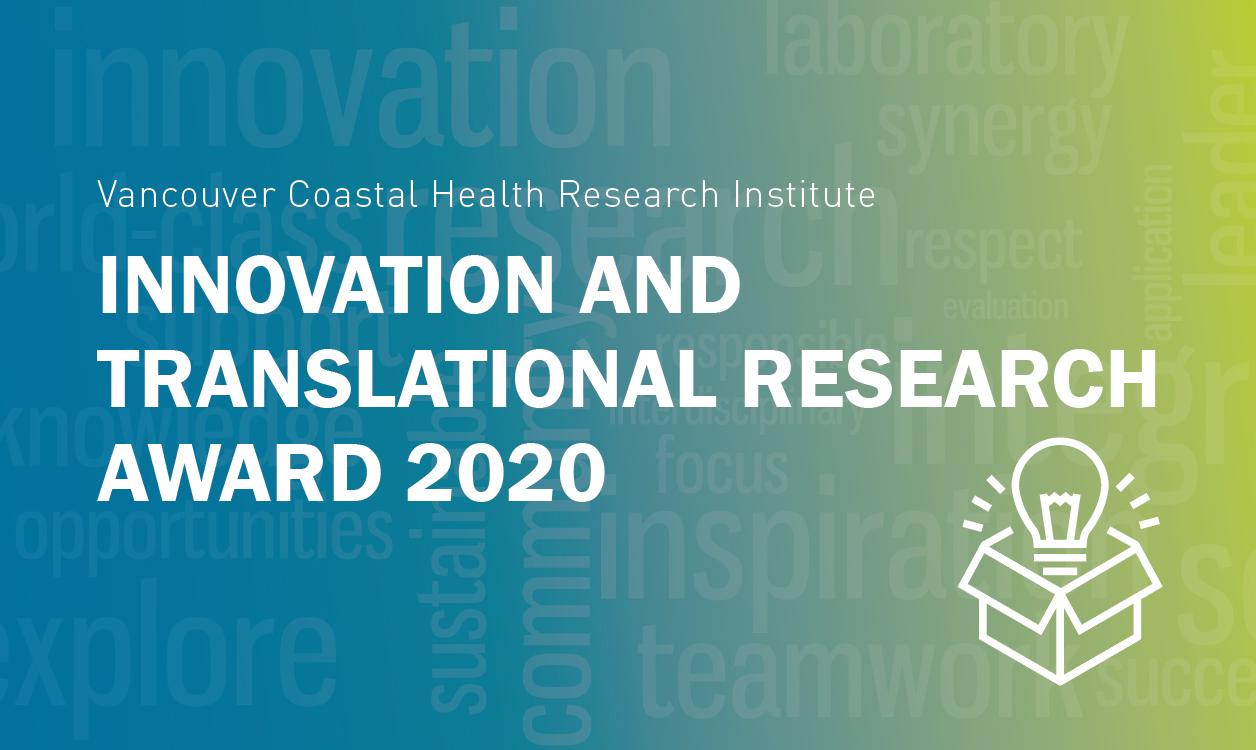
Congratulations to the 2020 Innovation and Translational Research Award recipients!
Today’s pioneering research discoveries are the key to tackling tomorrow’s health care challenges. From alleviating the burden of disease to improving quality of life, researchers are at the forefront of medical advances that support the health and well-being of patients and their families. Vancouver Coastal Health Research Institute is proud to contribute to the advancement of ground-breaking research with our annual Innovation and Translational Research Awards. This year’s recipients are putting new knowledge into practice, implementing research outcomes and turning discoveries into commercial opportunities.
The 2020 Innovation and Translational Research Award winners are:
- Dr. Maureen Ashe, investigator at the Centre for Hip Health and Mobility and an associate professor in the UBC Department of Family Practice
- Dr. Dirk Lange, director of basic science research at the VGH Stone Centre and an associate professor in the UBC Department of Urologic Sciences
- Dr. Christina Luong, head of stress echocardiography at VGH and a clinical assistant professor UBC Division of Cardiology
- Dr. Kenneth Madden, division head of geriatric medicine at VGH and an associate professor in the UBC Division of Geriatric Medicine
- Dr. Anna McGuire, thoracic surgeon at VGH and clinical assistant professor in the UBC Department of Surgery
- Dr. Titus Wong, regional medical director, Infection Prevention and Control at VCH and a clinical assistant professor in the UBC Division of Medical Microbiology and Infection Prevention
- Dr. Marc Deyell, director of the electrophysiology laboratory at St. Paul’s and a clinical assistant professor in the UBC Division of Cardiology
Getting patients moving to improve their health outcomes

Study: Out and about: Reablement for older adults in the hospital setting
Funded by: VGH & UBC Hospital Foundation
Long periods of sedentary behavior during an acute hospital admission can contribute to patients’ loss of mobility and the ability to complete activities of daily living (ADLs). To combat these issues, a new model of care called reablement will focus on enabling patients to set goals to help them continue moving and remain independent. It also incorporates family caregivers as an important part of the recovery process in hospital and at home.
Along with project co-lead Dolores Langford, Regional Allied Health Practice Director, Dr. Ashe and the research team will study if a family-caregiver intervention that outlines the benefits of adding more everyday activity into usual life routines can positively affect older patients’ mobility. Caregiver participants in the intervention group will receive training sessions that include strategies for reducing prolonged sedentary behaviors and increasing daily physical activity.
“As part of the study, we will be requesting that older adults wear an activity monitor to track their movements, and asking caregivers about their experience providing the information to their family members,” says Dr. Ashe.
Combatting urinary tract infections following catheterization

Study: Novel Photodynamic Approach to Combat Catheter Associated Urinary Tract Infections
Funded by: VGH & UBC Hospital Foundation
Catheter-associated urinary tract infections (CAUTIs) account for a vast majority of hospital-acquired infections and are a significant burden on the health care system and patient population. Current antibiotic-based treatments and coatings have not been effective at decreasing this significant problem and have made it worse by increasing antibiotic resistance, creating a greater need for alternative long-term strategies that do not use antibiotics to prevent the incidence of CAUTI.
“We have developed a novel photosensitive antimicrobial urinary catheter system based on photodynamic therapy, which generates antimicrobial reactive oxygen species from a photosensitizer following exposure to LED light,” explains Dr. Lange.
This novel system will have a significant impact on the extent of CAUTI cases as the light-based system can be used within minutes after a catheter is placed, and treatment can easily be repeated as much as necessary via insertion of a fiber optic light source into the catheter by patients at home. Dr. Lange highlights that the system has potential to decrease the significant cost, morbidity and mortality associated with CAUTI.
New imaging technology for detecting heart failure

Study: Automated LVEF in Heart Function Clinic: AI augmented point of care ultrasound
Funded by: VGH & UBC Hospital Foundation
The global burden of heart failure is increasing and is a major cause of death and disability. The left ventricular ejection fraction (LVEF) is a measurement, expressed as a percentage, of how much blood the left ventricle pumps out with each heartbeat. Accurate and timely estimation of the LVEF, most commonly done with an echocardiogram, is a cornerstone of heart failure management.
Due to the tenuous nature of heart failure patients, the Echo Lab accommodates for repeat or urgent scans for LVEF assessment, which can result in increased wait times for other cardiac patients. Methods to lessen demand for LVEF scans are greatly needed.
“Our goal with this study is to utilize point of care ultrasound as an application for automated LVEF at the VGH Cardiac Function Clinic,” says Dr. Luong. The application will be applied to portable ultrasound devices for use by heart failure clinicians for evaluation of LVEF at the bedside. Dr. Luong hypothesizes that this could reduce the need for formal repeat echocardiograms, thereby freeing up resources and reducing the number of appointments for heart failure patients.
A better way to screen for sarcopenia

Study: Using Bedside Ultrasound to Screen for Sarcopenia in Older Adults
Funded by: VGH & UBC Hospital Foundation
Sarcopenia is the reduction of muscle mass and muscle quality as we age, and is a risk factor in seniors for falls, fractures and increased mortality. Current best practice says that sarcopenia is diagnosed with dual-energy X-ray absorptiometry (DXA) scanning, but DXA scans are not approved to screen for the condition in Canada. Since recent advances have made bedside ultrasound technology readily available as a rapid bedside screening tool, Point of Care Ultrasound (PoCUS) could be a potential solution to aid in screening for and diagnosing sarcopenia.
“This study aims to use PoCUS to establish measures, such as muscle thickness and echointensity, as a new screening test for sarcopenia,” says Dr. Madden.
Dr. Madden notes that the establishment of an accurate bedside test for sarcopenia will facilitate earlier outpatient targeting for rehabilitation and protein supplementation prior to the patient undergoing a medical stressor, such as an acute illness or a surgical procedure.
Novel approach to molecular and immune biomarker testing in early lung cancer

Study: The Clinically Relevant Genomic and Immune Tumor Microenvironment in Early Stage Lung Cancer
Funded by: VGH & UBC Hospital Foundation
Non-small cell lung cancer (NSCLC) is the most common cause of cancer death worldwide. The only patients with a prospect of cure are those with early NSCLC who are amenable to surgery. Unfortunately many still experience poor long-term survival from tumor recurrence due to aggressive tumor microenvironment. Immunotherapy and tumor gene targeted therapy are promising approaches to improve survival rates with less toxicity than standard chemotherapy treatment. But testing for genomic alterations and immune biomarkers are not routinely conducted in resected surgical specimens from patients with early stage disease.
Dr. McGuire’s study objective is to test the use of a novel next generation sequencing (NSG) cancer gene panel to detect genetic alterations in NSCLC patient’s primary tumor after surgery, in addition to testing immune biomarker expression.
“We hypothesize that patients with lung tumor-specific gene alterations display different immune cell expression,” says Dr. McGuire. “This difference in the tumor micro-environment may help predict cancer recurrence after surgery beyond staging and histopathology features. This will help us identify who will benefit from additional personalized treatment after surgery.”
Using proven methods to prevent surgical site infections

Study: Surgical Site Reduction with Pre-Surgical Chlorhexidine Wipes and Nasal Photodisinfection
Funded by: Richmond Hospital Foundation and Lions Gate Hospital Foundation
Any time a surgery occurs and the skin is cut or broken, there is a chance for an infection to develop. Surgical site infections (SSIs) are a dangerous complication of surgery and incredibly costly to the health care system. To combat SSIs, researchers implemented a novel, non-antibiotic method at Vancouver General Hospital to prevent SSIs called pre-surgical decolonization with photodisinfection and chlorhexidine. Results of this world-first study showed a 40 per cent relative reduction of SSIs and cost-avoidance of roughly $2M during the study period.
“With this new study we hope to expand this innovative intervention to both Richmond Hospital and Lions Gate Hospital, including all elective adult orthopedic and neuro-surgery patients for the next two years,” says Dr. Wong.
If the results from the other hospitals are similar to those seen at VGH, Dr. Wong expects this study will help prevent SSIs and improve patient care, in addition to saving the health care system costs associated with additional surgeries and antibiotic treatments.
Targeting treatment for an abnormal heart rate

Study: Optimization of Radiation Delivery for the Treatment of Refractory Ventricular Tachycardia
Funded by: VGH & UBC Hospital Foundation, Vancouver Coastal Health Research Institute and Providence Health Care Research Institute
Ventricular tachycardia (VT) is a life threatening complication of structural heart disease that presents as a fast, abnormal heart rate. Despite recent advances in therapy, many patients have refractory VT episodes. Stereotactic cardiac radiosurgery to deliver targeted radiation has emerged as a promising way to treat refractory VT. Current methods for cardiac radiosurgery are limited in their ability to account for cardiac motion and reduce radiation to normal heart tissue and other organs.
“The overarching goal of this project is to develop novel methods to allow for more precise stereotactic radiation delivery for the treatment of VT,” says Dr. Deyell. “We ultimately hope to enhance the safety and precision of cardiac radiosurgery for the treatment of VT.”
This study will develop innovative techniques to advance cardiologists ability to more specifically target abnormal heart tissue causing VT using stereotactic radiosurgery. Dr. Deyell believes the techniques can be feasibly implemented on common imaging and radiation delivery platforms.


